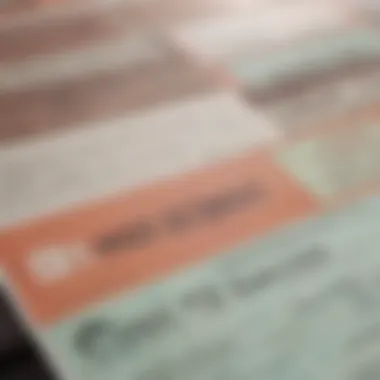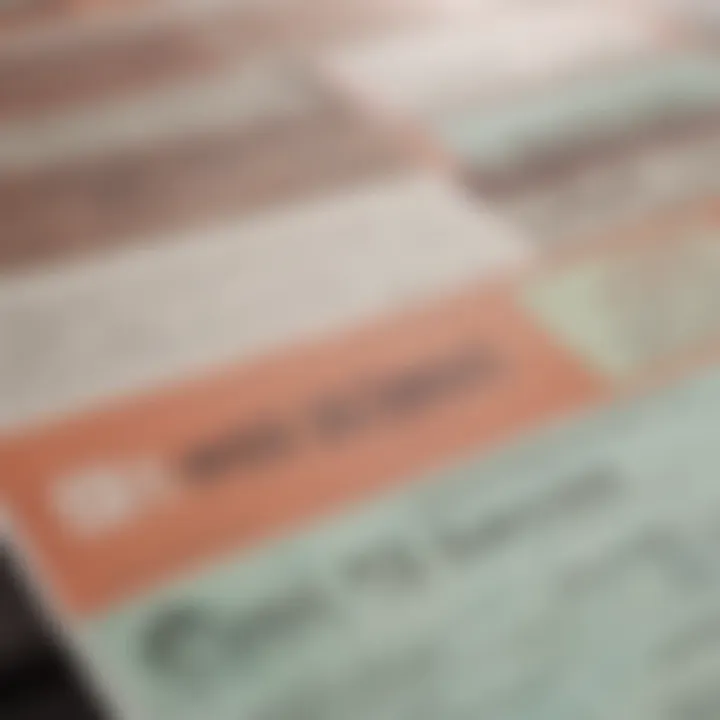Understanding Post-Dated Cheques: A Detailed Overview


Intro
In today's fast-paced financial world, understanding the tools available for managing payments is essential. One such tool that often flies under the radar is the post-dated cheque. What exactly is a post-dated cheque? This seemingly simple financial instrument carries complexities that can impact both the issuer and the recipient in significant ways. As we explore this topic, we will break down the workings of post-dated cheques, the legal implications surrounding them, and best practices to safeguard your financial interests.
Understanding post-dated cheques helps demystify their usage and promotes better decision-making within various financial contexts. From small businesses to casual transactions among friends, these cheques can serve a unique purpose in financial planning. Whether you’re a business owner looking to manage cash flow or an individual navigating personal finances, grasping the nuances of post-dated cheques is invaluable.
Throughout this piece, we will cover several key areas: the definitions and functions of post-dated cheques, the legal frameworks governing their usage, and the risks that may arise. By the end, you will have a solid understanding of how to effectively handle post-dated cheques and mitigate potential pitfalls. Let's dive in and illuminate the intricacies of this important financial concept.
Defining Post-Dated Cheques
Defining post-dated cheques is a crucial part of understanding their overall role in the financial landscape. These cheques represent a unique financial instrument, enabling individuals and businesses to plan payments with a specified future date. This can be particularly beneficial for budgeting and cash flow management. Post-dated cheques can serve as a safety net for fund availability and commitment between parties in a transaction.
Understanding the Basics
A post-dated cheque is simply a cheque that has a date set in the future. The issuer writes the cheque intending for it to be cashed on or after that specified date. This practice can be a double-edged sword. On one hand, it allows a payee to have confidence in receiving their payment at a designated time; on the other, it may bring confusion if parties are not well informed about the implications of such transactions.
Here are some basic factors to consider regarding post-dated cheques:
- Date specific practice: The most obvious characteristic of a post-dated cheque is the future date written on it. This informs the recipient when they can realistically present the cheque for payment.
- Intent and Trust: Post-dated cheques often rely heavily on the trust between the issuer and recipient. The issuer needs to be confident that funds will be available by the specified date.
- Legal considerations: Many jurisdictions have legal stipulations regarding the presentation of post-dated cheques. Understanding these laws is paramount to avoid potential disputes.
Key Terminology
Grasping the key terminology surrounding post-dated cheques helps demystify the concept further:
- Drawer: The individual or entity that issues the cheque, writing it on a specific bank account.
- Payee: The person or entity entitled to receive the payment stated on the cheque.
- Bank: The financial institution where the cheque is drawn and where the issuer's account resides.
- Stale Cheque: A cheque that is not cashed within a certain period after its date (typically six months).
- Bouncing: Occurs when there are insufficient funds in the issuer’s account when the cheque is presented for payment.
By incorporating these terms into your knowledge base, the understanding of post-dated cheques can be vastly improved, enabling clearer communication and better handling of financial transactions.
The Purpose of Post-Dated Cheques
Understanding the purpose of post-dated cheques is pivotal in grasping their role in financial transactions. They are not just a mere alternative payment method; they serve distinct functions that can be beneficial for both issuers and recipients. In essence, post-dated cheques help manage cash flow, establish trust in business relationships, and can be strategic tools in financial planning.
Utilization in Financial Transactions
Post-dated cheques are often utilized as a bridge in financial transactions where immediate payment isn't feasible. For instance, consider situations where an individual has a future financial obligation but lacks the liquid funds at the moment. Picture a freelancer who completes a project for a client but won’t receive their payment until a later date. The client might offer a post-dated cheque as a form of assurance, enabling the freelancer to schedule their finances while awaiting payment.
Benefits in Financial Transactions:
- Cash Flow Management: These cheques allow individuals and businesses alike to plan around future expenses, tailoring their cash flow accordingly.
- Avoiding Debts: Instead of relying on high-interest loans, individuals can use post-dated cheques to settle debts or financial obligations on time.
- Commitment Indicator: They signal that the issuer is committed to fulfilling the payment in the future, thus providing a sense of security in the transaction.
Common Scenarios for Use
To paint a clearer picture, consider the everyday scenarios where post-dated cheques come into play.
- Rental Agreements: Landlords often receive post-dated cheques for the rent due on future dates, allowing tenants to account for their upcoming financial commitments.
- Installment Payments: A car dealership might accept a post-dated cheque if a buyer opts for an installment plan to spread their payments over time, ensuring that the car remains financed in a structured manner.
- Personal Loans: Friends or family may also use post-dated cheques when issuing informal loans to each other; a common practice that helps to clarify the repayment timeline and promote accountability.
In summary, the purpose of post-dated cheques goes beyond mere convenience. They play a vital role in money management and in fostering trust between parties involved in transactions. Understanding their uses in specific contexts helps individuals navigate financial landscapes more effectively.
The Mechanics of Issuing a Post-Dated Cheque
Understanding the mechanics behind issuing a post-dated cheque is essential for anyone engaging in this financial practice. This involves not just the physical act of writing a cheque, but also an understanding of the underlying reasons, benefits, and considerations. Getting this right can significantly influence the financial relationship between the issuer and the recipient.
When a post-dated cheque is issued, the date on the cheque is set in the future—this means the recipient cannot cash it until that date arrives. The importance of this lies in the recipient's ability to plan their finances more accurately. For example, if a small business owner needs to pay a supplier but anticipates cash inflow only in a few weeks, issuing a post-dated cheque can ease the immediate cash flow pressure.
Here are some key aspects to consider:
- Trust and Reliability: Issuers of post-dated cheques often demonstrate a level of trustworthiness. Recipients feel more secure knowing that the payment will be honored at a specified future date.
- Financial Planning: This method aids in budgeting by allowing both parties to plan around a specific timeline for cash flow. It helps keep the financial wheels turning smoothly.
- Legal Grounding: Understanding the legalities behind post-dated cheques can protect both parties. Knowing the exact rights and obligations can mitigate future disputes.
"A cheque is more than just a slip of paper; it's a commitment to pay at a future date, symbolizing trust and financial planning."
Steps for Issuance
Issuing a post-dated cheque is not as simple as scribbling a future date and signing it. There's a deliberate process that should be followed to ensure that the cheque serves its intended purpose without unintended consequences. Here are the essential steps:
- Determine the Payment Amount: Clearly outline how much money you owe. Make sure it’s exactly what has been agreed upon to avoid confusion.
- Set the Post-Date: Choose a date that aligns with your financial situation. Be realistic about when you'll have funds available.
- Fill Out the Cheque: When writing the cheque, include the future date, payee name, and the amount in both numbers and words. Double-check for errors to sidestep potential issues later.
- Sign the Cheque: Just like any cheque, it needs your signature. This is your authorization for the recipient to cash it on the specified date.
- Communicate Clearly: Inform the recipient about the post-dated nature. Make sure they understand when they can cash the cheque and that they agree to the terms.
Information Required on the Cheque
Each post-dated cheque must contain certain crucial information to be valid. This isn't just about filling in details—it's about ensuring clarity and preventing misunderstandings. Here’s what should always be included:
- Date: Must reflect a future date. This is the first impression that sets the tone for the transaction.
- Payee Information: Clearly state who the cheque is for to avoid any mix-ups.
- Amount: Written clearly in both numbers and words. This helps to minimize disputes about how much is owed.
- Signature: A valid signature from the issuer is essential. It confirms that you stand behind the payment.
- Memo Line (Optional): Including a note can be helpful for both parties, specifying what the payment is for or any additional details.


By following these guidelines, one can avoid common pitfalls associated with post-dated cheques, ensuring a smoother transaction as a whole. Understanding each step is crucial to making the most of this financial tool.
Legal Considerations
When it comes to post-dated cheques, the legal landscape plays a critical role in defining their validity and enforceability. Understanding these legal considerations is more than just a formality; it serves as the bedrock for smooth financial interactions. For both issuers and recipients, knowing the regulatory frameworks and enforceability can prevent misunderstandings and potential disputes. By delving into this topic, stakeholders can safeguard their interests and enhance their financial decision-making.
Regulatory Frameworks
Regulatory frameworks surrounding post-dated cheques vary significantly from one jurisdiction to another. This inconsistency creates a complex web that both issuers and recipients must navigate. In many countries, legislation outlines the validity of post-dated cheques, clarifying when and how these instruments can be presented for payment.
For instance, in the United States, the Uniform Commercial Code (UCC) governs negotiable instruments, including post-dated cheques. Under UCC regulations, a post-dated cheque is generally treated similarly to other types of cheques, but issuers often face the challenge of banks processing them before the date specified, unless proper restraints have been established.
In other regions, such as India, the Negotiable Instruments Act, 1881 offers guidance. This act recognizes post-dated cheques but imposes certain stipulations for their acceptance. Such regulations are vital as they define the rights and responsibilities of all parties involved.
"Regulatory environments can be a double-edged sword—providing protection but also requiring vigilance."
For stakeholders, being aware of local laws and practices becomes paramount to effectively utilize post-dated cheques and avoid potential pitfalls.
Enforceability of Post-Dated Cheques
The enforceability of post-dated cheques is a crucial aspect that can sway a financial decision. Simply put, enforceability refers to whether a post-dated cheque can legally compel payment at the bank upon its presentation. While a post-dated cheque presents a promise, it's essential to understand that it carries legal constraints.
One major point of contention arises from the date on a post-dated cheque. If someone attempts to cash or deposit it before that specified date, it often leads to rejection. The law provides a grey area; in some jurisdictions, the bank may honor the cheque, while in others, they may refuse outright. This inconsistency emphasizes the importance of clear communication between issuers and recipients.
Moreover, should a dispute arise regarding payment, the courts generally base their rulings on the stipulations laid out in the applicable legislation. For instance, if all formalities for issuing the cheque were followed, including the issuer’s consent, a recipient may have a stronger case for enforcement in court.
In essence, issuers must take care to document their agreement and maintain a record aligning with the specific date mentioned on the cheque. This practice helps in the unfortunate case where a payment dispute emerges.
Understanding these legal aspects of post-dated cheques not only protects one's interests but also fosters a more trusting financial relationship. As the saying goes, "A stitch in time saves nine," and being knowledgeable about the legalities can prevent bigger headaches down the line.
Benefits of Using Post-Dated Cheques
In the world of finance, post-dated cheques offer unique advantages that resonate with various stakeholders, from individuals managing personal budgets to businesses navigating cash flow challenges. Understanding these benefits is essential for anyone looking to optimize their financial transactions. Post-dated cheques, when used responsibly, can serve as powerful tools in both personal finances and business dealings, promoting caution and confidence in monetary exchanges.
Financial Planning Advantages
When it comes to financial planning, post-dated cheques can significantly ease the burden of managing future payments. For instance, consider a scenario where someone is expecting a larger expense, such as an upcoming tuition fee or a major purchase, but lacks the ready cash. By writing a post-dated cheque, they can secure the payment now while ensuring it only gets cashed at a specified later date when funds are available.
This strategy has several beneficial aspects:
- Cash Flow Management: Borrowing from one's future income is a time-honored tactic. By scheduling the payment for a time when funds are assured, individuals can avoid overdraft fees or other penalties associated with insufficient funds.
- Budgeting Clarity: Knowing the exact amount that will be withdrawn from one’s account in the future allows for better allocation of resources. It helps individuals to plan their monthly budgets with more certainty and reduces anxiety over late payments.
- Commitment to Savings: In some cases, an issuer might decide to set aside money in advance, knowing the cheque will be deposited later. This can foster a disciplined savings habit, encouraging better financial practices overall.
The clarity and structure offered by post-dated cheques thus empower individuals to navigate their financial landscape more strategically, aiding in both short-term planning and long-term financial goals.
Trust-Building in Transactions
Trust is the cornerstone of financial transactions. Post-dated cheques can act as a bridge, reinforcing trust between parties in various dealings. When one party provides a post-dated cheque to another, it signals a commitment to fulfill an obligation, indicating respect and assurance.
- Enhancing Reliability: By presenting a post-dated cheque, an issuer shows intention to meet their future financial obligation. This reliability can significantly improve relationships between business partners, freelancers, and clients. It demonstrates that one values the trust placed in them, which can enhance long-term partnerships.
- Clarifying Intentions: Unlike verbal agreements that can be misunderstood or forgotten, a post-dated cheque serves as a written commitment. It communicates a clear intention and timeline, reducing guesswork in transactions and helping both parties stay informed.
- Facilitating Negotiations: In negotiation settings, offering a post-dated cheque can be an effective strategy to build goodwill. It may help to seal a deal by providing assurance of payment in a manner that feels safe and structured for both sides.
As transactions increasingly transcend personal and cultural boundaries, building trust through mechanisms like post-dated cheques becomes not just beneficial, but imperative.
"Post-dated cheques are not just promises of future payments but also commitments toward building reliable relationships in a financial ecosystem."
Risks Associated with Post-Dated Cheques
When it comes to financial transactions, post-dated cheques often present unique challenges. Understanding the risks involved with these instruments is key for both issuers and recipients. Properly navigating these risks can make the difference between a smooth transaction and a financial headache. The importance of highlighting these potential pitfalls cannot be overstated, as they can have significant implications for all parties involved.
Potential Issues for Issuers
Issuing a post-dated cheque might seem straightforward at first glance, but several risks can arise for the person writing the cheque.
One major concern is that of timing. If the recipient decides to cash the cheque before the indicated date, the issuer could face issues like insufficient funds, leading to bounce fees and potential damage to their credit score.
Moreover, there's the matter of trust. When you hand over a post-dated cheque, you are relying heavily on the other party to honor the terms you have set. Should they choose to disregard the date, the trust necessary for successful transactions may erode.
Legal implications are another area of concern. If the funds are not sufficient by the time the cheque is cashed, issuers may find themselves tangled in legal disputes. Recovering unpaid amounts can be time-consuming and could potentially involve collections agencies or civil court.
Consider this:
"A post-dated cheque is like a promise cast in ink; if it crumbles, both parties might suffer the consequences."
Concerns for Recipients


For recipients of post-dated cheques, the worries can be just as prevalent. The primary risk is the possibility that the issuer might default, either due to insufficient funds or a sudden change in financial circumstances. As a recipient, cashing that cheque before its date comes with a gamble—one that might lead to financial loss.
Another consideration is related to trustworthiness. Not every cheque makes it to the bank without complications. In some scenarios, recipients might feel compelled to conduct background checks on issuers before accepting post-dated cheques. This can take time and cause strain on relationships, especially if both parties are familiar.
Moreover, if a recipient unknowingly deposits the cheque before the date, they could find themselves dealing with bounced cheque fees, which can add unnecessary costs and create an awkward dynamic between both parties.
The landscape surrounding post-dated cheques is fraught with potential issues, making it crucial for both issuers and recipients to approach them with caution and informed understanding. Addressing the outlined risks proactively allows all parties to minimize financial implications and maintain healthy financial relations.
Best Practices for Handling Post-Dated Cheques
Proper handling of post-dated cheques is paramount, as it can greatly mitigate risk and enhance trust between both parties involved. When issuing or receiving these cheques, understanding best practices can pave the way for smoother financial transactions and help avoid misunderstandings. These guidelines not only fortify the integrity of the transaction but can also streamline any future dealings.
Advice for Issuers
Issuers, those who write out post-dated cheques, have a critical responsibility to ensure the cheque is managed wisely.
- Provide Clear Communication: Let the recipient know the date the cheque can be cashed. Lack of clarity can lead to premature attempts at cashing, potentially ruining trust in the transaction.
- Keep Good Records: Maintain a record of all issued post-dated cheques, including details like the amount, recipient, and issue date. This helps protect against potential disputes and keeps track of financial commitments.
- Monitor Funds Availability: Before issuing a post-dated cheque, ensure that sufficient funds will be available in the account by the date specified in the cheque. This avoids the headaches of bounced cheques and associated fees.
- Use Secure Delivery Methods: If sending a post-dated cheque through the mail, consider using tracked services or delivery confirmation to ensure it reaches the correct recipient safely.
Issuers who follow these steps minimize risks involved in giving a promise to pay at a future date. It assures the recipient that you are managing your finances responsibly.
Guidelines for Recipients
For recipients who receive post-dated cheques, there are also vital practices to keep in mind.
- Verify with the Issuer: Reach out to the issuer to confirm details surrounding the post-dated cheque, including the date it can be deposited, to align your expectations accurately.
- Store Cheques Safely: Keep post-dated cheques in a secure location until the agreed-upon cashing date. This protects against loss, theft, or damage, which could complicate the transaction.
- Set Reminders: Use a calendar or reminder system to note when the cheque can be cashed. This proactive approach allows you to manage your finances more effectively.
- Check Fund Availability: Just as issuers must consider funds, recipients should verify that the issuer has not issued too many cheques that could lead to insufficient funds on the cashing day.
Following these guidelines ensures that recipients do not face unexpected issues when cashing post-dated cheques.
In any financial transaction, transparent communication and due diligence can guard against common pitfalls.
By implementing these practices, both issuers and recipients can create a solid foundation for handling post-dated cheques, which is crucial in maintaining a healthy financial relationship.
Comparative Analysis with Other Payment Methods
A thorough understanding of post-dated cheques isn't complete without examining how they measure up against other payment methods. Whether you're an investor pondering which transaction method to use or an advisor helping clients make informed choices, it's essential to look at the strengths and weaknesses of post-dated cheques compared to other common financial instruments. In this section, we'll dive into a comparison of post-dated cheques against regular cheques and electronic payments, highlighting aspects ranging from security to convenience.
Post-Dated Cheques vs. Regular Cheques
When comparing post-dated cheques to regular cheques, it’s important to understand their primary differences. Regular cheques are generally processed immediately or within a short time frame. Once written and cashed, the funds are deducted from the issuer’s account right away. In contrast, post-dated cheques carry a future date, meaning they can stay in the drawers of recipients until that specific date comes around.
Key Considerations:
- Timing: A regular cheque is effective upon writing, whereas a post-dated cheque allows for future cashing. This provides the payer a chance to manage cash flows more effectively.
- Risk Factors: Banks typically process regular cheques as soon as they are presented, potentially leading to overdrafts if the issuer is unaware of the balance. Post-dated cheques can help in circumventing that risk, granting issuers a bit of breathing room.
- Trust Factor: Regular cheques carry a more immediate obligation, which can both foster and strain trust. On the flip side, a post-dated cheque could signal to the recipient that the issuer is planning for future payment, yet it might create ambiguity in serious transactions.
"Choosing between post-dated and regular cheques involves understanding the timing and risk at play. One isn't necessarily better than the other; it’s context that matters."
This comparison shows that while both methods have their utilities, the selection largely depends on the financial situation of the parties involved.
Post-Dated Cheques vs. Electronic Payments
In an increasingly digital society, understanding how post-dated cheques stack up against electronic payments is crucial. Electronic payment systems like PayPal, Venmo, or direct bank transfers have transformed the way people transact. They offer convenience and speed, but may lack some traditional features that post-dated cheques provide.
Critical Aspects:
- Speed: Electronic payments are typically immediate. Once processed, the funds are available without waiting. In contrast, a post-dated cheque won’t even be cashed until the designated date passes.
- Tracking and Security: Electronic payments often come with robust tracking and security features. You get instant notifications, and there's usually a clear transaction history in your account. Post-dated cheques, on the other hand, might not add the same level of transparency. Misplacing a cheque can lead to complications during cashing.
- Cost: Some electronic payment platforms charge fees for transactions. A post-dated cheque may incur fewer costs if issued between acquaintances, as no fees are generally associated with the cheque itself.
Ultimately, the choice between post-dated cheques and electronic payments can hinge on both the nature of the transaction and personal preference. For some folks, the digital age offers an efficiency that can outweigh the benefits of traditional methods like post-dated cheques.
In summary, understanding post-dated cheques through this comparative lens offers valuable insights into not only how these instruments work, but also how choosing the right one for your financial needs can impact your transactions.
Cultural Perspectives on Post-Dated Cheques
Understanding the cultural perspectives on post-dated cheques is not just an academic exercise, but it opens the door to a more nuanced view of how financial practices evolve according to societal norms. These cheques serve vastly different roles depending on the cultural and economic conditions surrounding their use, which can lead to unique benefits and underlying considerations that must be navigated carefully.
Variations Across Different Countries
In countries like the United States, post-dated cheques are often viewed with skepticism. The banking system typically deposits a cheque on the presentation date, regardless of the stated date—this can lead to potential overdraft fees for the issuer. In contrast, countries such as Canada have embraced this tool much more readily within their financial practices. Canadians regularly use post-dated cheques for lease payments and bills, with a mutual understanding that these cheques won’t be cashed until the agreed-upon date.
In Japan, post-dated cheques have been gaining traction. Here, they can symbolize trust—an agreement between parties to execute a payment at a specific time. However, this reliance on trust can create cultural expectations around punctuality that may not align with practices in other regions. For instance, in some Middle Eastern countries, the concept may be less understood or widely accepted, leading to miscommunication in financial dealings.
In contrast, Latin American countries often have a more informal approach, where a handshake agreement may be preferred over a written promise like a post-dated cheque. Here, cultural elements such as familial relationships can supersede formal financial methods. In regions where formality in financial transactions is less prioritized, post-dated cheques might not carry the same weight of responsibility.


Impact of Culture on Usage
The impact of culture on the usage of post-dated cheques cannot be understated. In many societies, the acceptance of these financial instruments goes hand in hand with a broader cultural context of trust and obligation. For example, in cultures where familial bonds and trust are paramount, individuals might be more inclined to rely on post-dated cheques to manage personal transactions seamlessly.
"In various cultures, the gauge of reliability can lead to differing perceptions of post-dated cheques."
Moreover, how people view debt and obligations can color their perceptions of these financial tools. In some Eastern cultures, where the concept of saving face is critical, issuing a post-dated cheque is seen as a way to preserve one's honor by ensuring a promise of payment is secured.
On the flip side, in places where a consumer-driven mindset prevails, as in parts of Europe and North America, the use of post-dated cheques might be perceived with suspicion, as they can imply a lack of liquidity or financial stability. This cultural lens might lead to fewer jurisdictions utilizing this method routinely.
Examining the Future of Post-Dated Cheques
Understanding the future of post-dated cheques is crucial, especially as technology continues to reshape our financial landscape. As we look ahead, several elements come into play—new trends in financial transactions hinting at a shift in how people view these instruments, along with emerging technologies that can significantly impact their usage.
The bounce of digital payment systems has raised questions about the relevance of traditional methods like post-dated cheques. While they remain a vital part of many transactions, their role may evolve. Financial literacy is essential, as investors, financial advisors, and consumers need to grasp these changes to ensure they are making informed decisions.
Trends in Financial Transactions
In recent years, there's been a noticeable shift in how people engage in financial transactions. The advent of mobile payment applications and online banking has altered expectations. Cash and checks are being cast aside in favor of instant transactions. Despite this, post-dated cheques still hold sway in many business deals and personal arrangements. Here are some trends worth noting:
- Growing Popularity of Digital Wallets: More users are migrating to platforms such as PayPal and Venmo, which offer speed and convenience. In contrast, post-dated cheques can appear antiquated in these circumstances.
- Rise of Electronic Funds Transfers: With many institutions adopting electronic resources for bank transfers, the versatility of post-dated cheques may need reconsideration. As these systems streamline payments, consumers might opt for immediate solutions instead.
- Interest in Cryptocurrency Transactions: As cryptocurrencies gain traction, future transactions may evolve to include forms of payment unseen currently, impacting the perceived value of post-dated cheques.
On top of these trends, the desire for accountability and record-keeping remains. Many individuals still prefer the trackable option that a cheque provides, especially in formal agreements. This unique characteristic means post-dated cheques could find a way to coexist closely with newer technologies, perhaps in hybrid formats.
Technological Innovations and Impact
The weekend of traditional finance is often overshadowed by a burgeoning world of technology. With fintech advancements, the landscape for post-dated cheques is quite ambitious. Technologies such as blockchain and artificial intelligence are likely to change the game.
- Blockchain Technology: This innovation offers an unprecedented level of security and transparency for transactions. Imagine a future where post-dated cheques are encrypted in blockchain systems, ensuring that both parties are secure, and submission dates are immutable. This can lead to enhanced trust between issuers and recipients.
- Artificial Intelligence: AI could potentially monitor cheque submissions and alerts, notifying involved parties of coming due dates. This could help mitigate some of the risks associated with post-dated cheques, making them more reliable and less prone to forgetfulness or mishaps.
- Digital Signatures and Verification Processes: They would simplify the traditional cheque signing. Users might leverage secure apps to create, sign, and send post-dated cheques digitally, bypassing the need for physical transportation while maintaining regulatory compliance.
Emerging tech can't erase the utility of post-dated cheques just yet. Their adaptability could lead to a fresh chapter in their existence, intertwining legacy practices with modern efficiency. As we chart this course, keeping an eye on these trends will aid in grasping future dynamics and decision-making regarding financial transactions.
Finale
In concluding this discussion on post-dated cheques, it is critical to reflect on several key elements that underline their purpose and significance in financial transactions. A post-dated cheque, while seemingly simple in nature, serves various multifaceted roles within the realm of finance. Understanding these roles can empower both issuers and recipients to navigate the complexities involved in their usage effectively.
Recap of Key Points
To crystallize our understanding, let's revisit the essential points discussed throughout the article:
- Definition and Purpose: Post-dated cheques are written with a future date, allowing for planned financial transactions and aiding companies and individuals in better cash flow management.
- Legal Framework: Each jurisdiction has its own regulations surrounding the enforceability and legitimacy of post-dated cheques, which necessitates a careful consideration of these legal nuances before issuance or acceptance.
- Benefits: Their use fosters trust among parties and facilitates financial planning as it allows issuers to align payments according to cash flow.
- Risks: Both issuers and recipients should be aware of potential risks involved, such as delayed payments or the likelihood of bouncing if the funds are not available.
- Best Practices: Understanding best practices, including how to fill a cheque properly and maintain communication with all parties involved, can mitigate some of the systemic risks.
- Cultural perspectives and future trends: This tool also varies significantly in its acceptance and usage across different cultures, pointing towards an evolving landscape shaped by technological advancements in payment methods.
Final Thoughts on Post-Dated Cheques
Considering the practical implications, it becomes clear that while post-dated cheques offer a means to manage payments gracefully, they require diligence from both parties. Navigating this financial tool effectively hinges on a thorough understanding of its mechanics, as well as the legal and practical contexts in which one operates.
It is essential for individuals—including investors, financial advisors, students, and analysts—to remain informed and adapt to changing trends in payments, technology, and legislation that might influence the use of post-dated cheques. Being proactive can significantly minimize risks and maximize the benefits of using this financial instrument in various scenarios.
In closing, as the financial landscape continues evolving, maintaining an informed stance on tools such as post-dated cheques can undoubtedly enhance decision-making and foster a more nuanced understanding of one's financial interactions.
Key elements that underscore the importance of well-curated references include:
- Credibility: Citing authoritative sources bolsters the reliability of the information presented and helps build a reader’s trust.
- Contextual Understanding: References shed light on the broader context, illustrating how post-dated cheques fit within the larger financial landscape.
- Critical Analysis: Engaging with studies encourages critical thinking, prompting readers to reflect on diverse perspectives.
- Informed Decision-Making: Readers who delve into referenced materials can draw more informed conclusions for their own financial practices.
"Good information is valuable. It’s the foundation upon which sound decisions are built."
Thus, the references section serves as both a tool for deepening understanding and a guide for those seeking further knowledge about post-dated cheques. They are essential for navigating the complexities of the topic efficiently.
Cited Studies and Literature
When discussing post-dated cheques, referencing relevant studies and literature plays a crucial role in substantiating the claims made. Various academic articles, financial reports, and legal documents provide a wealth of knowledge about how post-dated cheques are utilized across multiple scenarios. For example, a research paper may delve into the enforceability of post-dated cheques in different jurisdictions.
Additionally, market analysis reports can reveal trends and patterns pertaining to how consumers and businesses perceive the utility of post-dated cheques. Integrating such studies equips readers with statistics and empirical evidence that enrich their understanding.
Some significant areas of focus in cited studies include:
- The historical background of post-dated cheques.
- Examination of case law regarding disputes over post-dated cheques.
- Comparative studies of usage trends between post-dated cheques and other payment methods.
Further Reading Resources
For those keen on furthering their knowledge about post-dated cheques, there are ample resources available, ranging from academic articles to online forums. These resources can serve as launching pads for more extensive research.
Recommendations for further reading might include:
- Books on Financial Management: Titles that cover cheque usage and fiscal responsibility offer a more foundational understanding.
- Legal Journals: Articles discussing the implications of the law on financial transactions, with a segment dedicated to post-dated cheques.
- Online Communities: Platforms such as Reddit can provide anecdotal evidence and real-life experiences from users dealing with post-dated cheques.
- Educational Websites: Websites like Britannica offer summaries and analyses that capture the evolution and significance of post-dated cheques in finance.
In summary, the references and recommended readings significantly enhance the reader's comprehension of post-dated cheques, providing a well-rounded view that can lead to greater financial awareness and empowerment.







